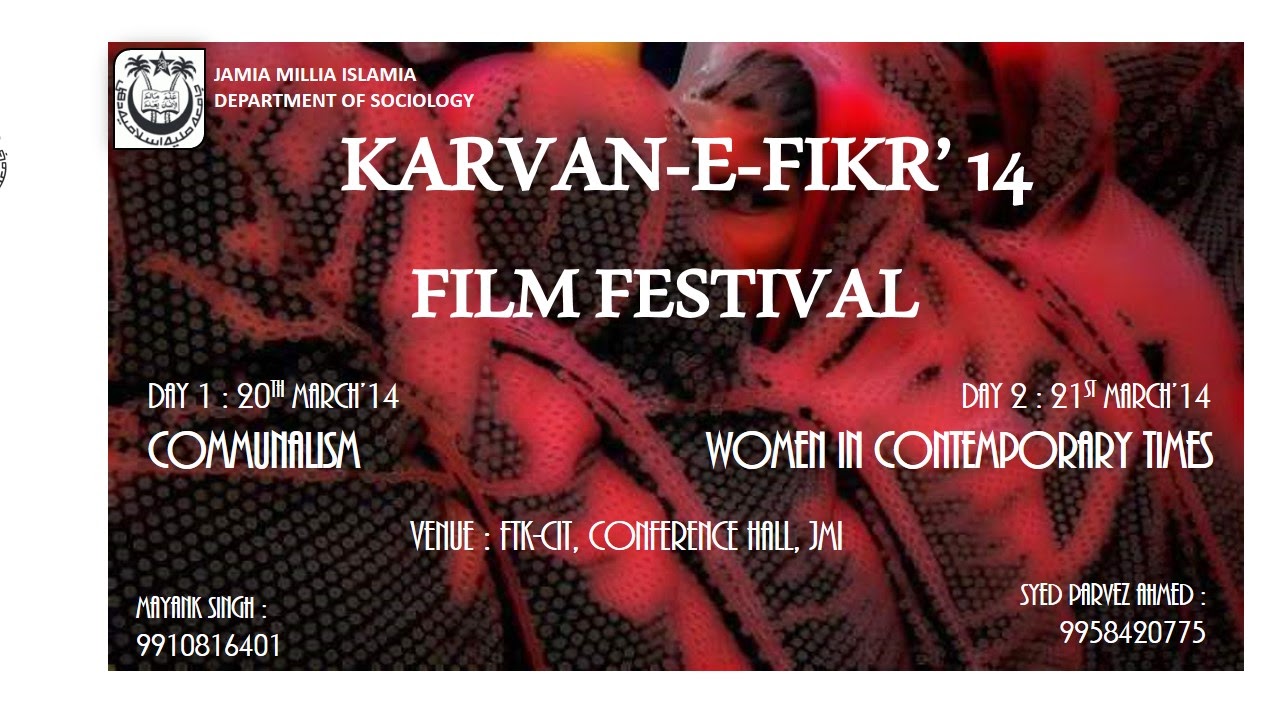KARVAN-E-FIKR, 2014
Theme: FOOD, AGRICULTURE AND ECOLOGY
18th & 19th of March, 2014
A two day Inter-University
Student Seminar, organised by the Subject
Association, Department of Sociology, Jamia Millia Islamia, New Delhi as a
part of its Annual Festival, Karvan-e-Fikr, 2014.
Concept Note:
It
is the production of our material needs in any era, Marx noted, that determines
our social existence. Food is perhaps the most important of these material
needs. The question – who produces and who consumes? – remains one of the most
important question for all of us. It is unavoidable and necessary for us to
investigate the social relations that come into existence between the producers
and the consumers. The relationship between the producers of food and the
consumers remains a highly hierarchical one, and now with the coming of the
global capital companies like Monsanto are further aggressively appropriating
resources and monopolizing the process of production leading to further
marginalization of the producers.
A
glaring cleavage has appeared between the developed and the underdeveloped
nations with the former accusing the latter of “eating more” – this, when
millions across Asia and Africa remain malnourished and constantly prone to
starvation and loss of life. Suggestions from the First World have called for
the production of biodiesel in place of food grains. The food divide has
therefore extended to a new phase – production for what? Luxury or Survival?
The American way of life or a morsel of food for a Sudanese orphan?
In
India, we observe that a massive disparity exists between different sections of
society with respect to food and agriculture. Is a more equitable food
distribution not possible? What steps could possibly be taken to meet such a
goal? Studies by groups have claimed that the introduction of
GM seeds, excessive use of fertilizers etc has not only led to a loss of
production in many cases but have also caused environmental and ecological
concerns. Is there, therefore, a need to relook and re-evaluate the process of
production that we have come to accept as Gospel truth? Is it possible to
imagine a process of production that is in harmony with nature as well as with
man?
The
purpose of holding this student seminar would be, to firstly, understand the
process of production. How, over the ages, various stimuli have
managed to cause restructuration of the entire process of production and what
we produce. Secondly, the question of food security or rather more seemingly
that of food insecurity has also surfaced and needs to be fully understood and
tackled both at the global as well as the local level. The issue of the right
to access to basic minimal levels of nutrition for all becomes, properly
understood, the right to life itself and hence must be taken up at a
war-footing. Thirdly, we also find the
issue of agriculture itself getting Capitalized and how as a result certain
belts of farmlands are finding it difficult to compete with other belts for the
lack of material resources. Lastly, another burning issue that the topic deals
with is the diagnosis of social relations of agricultural communities as well
as production relations with added emphasis on the position and role of women.
Original Academic and Research Papers are invited on
the following themes:
1. Changing
Agricultural Trends in India.
· 2. Impact of
Globalization and International Capital on Food Production and Distribution.
· 3. Social Relations
between Producers and Consumers.
· 4. The Right to Food
and Issues regarding equitable distribution, entitlement and allocation.
· 5. The Role of the
State.
· 6. The Role of
academicians, filmmakers, NGOs, journalists, scientists, environmental groups
and the civil society.
· 7. Issues and Debates
between the Developed and Underdeveloped Countries.
· 8. Role and Status
of women in changing agricultural societies.
Guidelines for Paper Presenters:
Please
note that the outlined themes are indicative and suggestive only. Papers
touching upon other relevant issues around the theme of FOOD, AGRICULTURE AND
ECOLOGY can also be considered for presentation. The call for papers is open to
UnderGraduates and PostGraduates students. Research scholars or research
assistants/associates studying in government approved educational institutions
from all streams. The presentations may use audio visual materials wherever
relevant. The expected length of the final paper to be submitted may range from
2500 to 4000 words to be presented in 15 minutes. Local TA will be paid to the
paper presenters, chairs and discussants. The interested participants should
send an abstract of 250-300 words to be screened by the
Faculty of the Department of Sociology, JMI by 3rd March,
2014 to the following email id. Abstracts can be submitted in English, Hindi or Urdu.
karvanefikr@gmail.com
For further queries contact:
Homam Ajmal (+91 874 484 7114) ; khan.homam@gmail.com
Aakanksha Baruah (+91 999 984 2913) ; aakankshab@ymail.com
Burhan Qureshi (+91 965 406 3320) ; bhq111@gmail.com
Shefali Rattan (+91 986 875 4522) ; shefalirattan@yahoo.co.in
Visit us at: www.karvanefikr.blogspot.com


+(2).png)

